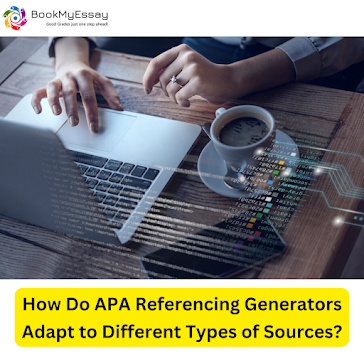In the ever-evolving landscape of academic writing, proper citation is the backbone of scholarly integrity. The American Psychological Association (APA) style is widely used for academic and research papers, requiring meticulous attention to detail in referencing various sources. In the digital age, where information comes in various formats, the use of APA referencing generator free has become indispensable. This blog post explores how these tools adapt to different types of sources, ensuring seamless and accurate citations.
The Evolution of APA Referencing Generators:
APA referencing generators have come a long way from their inception. Initially, they were basic tools that could only handle straightforward sources like books and journal articles. However, as the diversity of information sources expanded, so did the capabilities of these generators. Today, users can find free APA citation website generator tools equipped to handle a myriad of sources, including websites, online articles, and even social media posts.
Adaptability to Online Sources:
One of the challenges in modern academia is citing online sources. With the proliferation of information on the internet, citing websites, blogs, and online articles has become a common requirement. APA referencing generators have risen to the occasion, providing users with the ability to input URLs and generate accurate citations. These tools understand the nuances of online sources, including the need for retrieval dates and proper formatting of web addresses.
Social Media Citations:
In the era of social media dominance, researchers often find themselves citing content from platforms like Twitter, Facebook, or Instagram. APA referencing generators have adapted to this trend, offering specific fields for usernames, post dates, and URLs. By integrating these details, these tools ensure that citations for social media content meet APA standards, maintaining the precision required in academic writing.
Factoring in Multimedia:
Incorporating multimedia sources into academic work is increasingly common, with researchers citing videos, podcasts, and other audiovisual materials. APA referencing generators have evolved to accommodate these sources, allowing users to input specific details such as timestamps for videos or episode numbers for podcasts. This adaptability ensures that citations accurately reflect the source material, whether it's a TED Talk or a podcast interview.
The Role of Free APA Citation Website Generator Tools:
The accessibility of academic resources is a key consideration, and many students and researchers seek free tools to aid in their work. Free APA citation website generator tools have become invaluable in this regard, offering a range of features without the financial burden. Users can benefit from accurate citations for various sources, ensuring that cost is not a barrier to producing high-quality academic work.
Conclusion:
In conclusion, the adaptability of APA referencing generators to different types of sources is a testament to their importance in modern academic writing. As information continues to diversify and expand across various platforms, these tools play a crucial role in maintaining the integrity of scholarly work. From websites and social media to multimedia sources, factoring calculator tool have evolved to meet the challenges of the digital age, providing users with the means to create accurate and compliant citations effortlessly. Whether you are a seasoned researcher or a student navigating the intricacies of citation, leveraging the capabilities of these tools can significantly streamline the referencing process.









No comments:
Post a Comment
Note: only a member of this blog may post a comment.